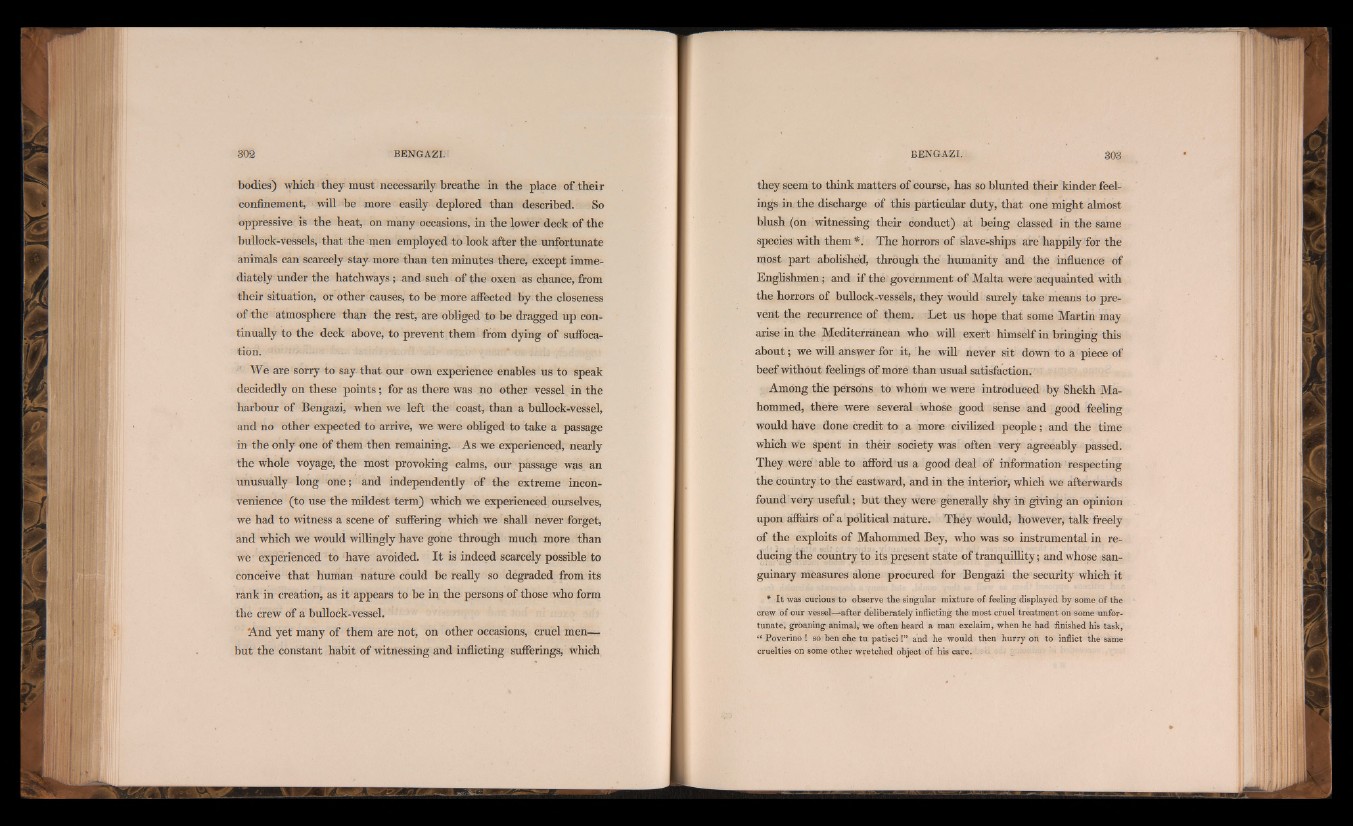
bodies) which they must necessarily breathe in the place of their
confinement, will be more easily deplored than described. So
oppressive is the heat, on many occasions, in the lower deck of the
bullock-vessels, that the men employed to look after the unfortunate
animals can scarcely Stay more than ten minutes there, except immediately
under the hatchways; and such of the oxen as chance, from
their situation, or other causes, to be more affected by the closeness
of the atmosphere than the rest, are obliged to be dragged up continually
to the deck above, to prevent them from dying of suffocation.
We are sorry to say that our own experience enables us to speak
decidedly on these points; for as there was no other vessel in the
harbour of Bengazi, when we left the coast, than a bullock-vessel,
and no other expected to arrive, we were obliged to take a passage
in the only one of them then remaining. As we experienced, nearly
the whole voyage, the most provoking calms, our passage was an
unusually long one; and independently of the extreme inconvenience
(to use the mildest term) which we experienced ourselves,
we had to witness a scene of suffering which we shall never forget,
and which we would willingly have gone through much more than
we experienced to have avoided. I t is indeed scarcely possible to
conceive that human nature could be really so degraded from its
rank in creation, as it appears to be in the persons of those who form
the crew of a bullock-vessel.
And yet many of them are not, on other occasions, cruel men—
but the constant habit of witnessing and inflicting sufferings, which
they seem to think matters of course, has so blunted their kinder feelings
in the discharge of this particular duty, that one might almost
blush (on witnessing their conduct) at being classed in the same
species with them *. The horrors of slave-ships are happily for the
most part abolished, through the humanity and the influence of
Englishmen ; and if the: government of Malta were acquainted with
the horrors of buUock-vesséls, they would surely take means to prevent
the recurrence of them. Let us hope that some Martin may
arise in the Mediterranean who will exert himself in bringing this
about; we will answer for it, he will never sit down to a piece of
beef without feelings of more than usual satisfaction.
Among the persons to whom we were introduced by Shekh Ma-
hommed, there were several whose good sense and good feeling
would have done credit to a more civilized people ; and the time
which we spent in thëir society was often very agreeably passed.
They were able to afford us a good deal of information respecting
the country to the eastward, and in the interior, which we afterwards
found very useful ; but they were generally shy in giving an opinion
upon affairs of a political nature. They would, however, talk freely
of the exploits of Mahommed Bey, who was so instrumental in reducing
the country to its present state of tranquillity; and whose sanguinary
measures alone procured for Bengazi the security which it
* It was curious to observe the singular mixture of feeling displayed by some of the
crew of our vessel—-after deliberately inflicting the most cruel treatment on some unfortunate,
groaning animal, we often heard a man exclaim, when he had finished his task,
“ Poverino ! so ben che tu patisci !” and he would then hurry on to inflict the same
cruelties on some other wretched object of his care.